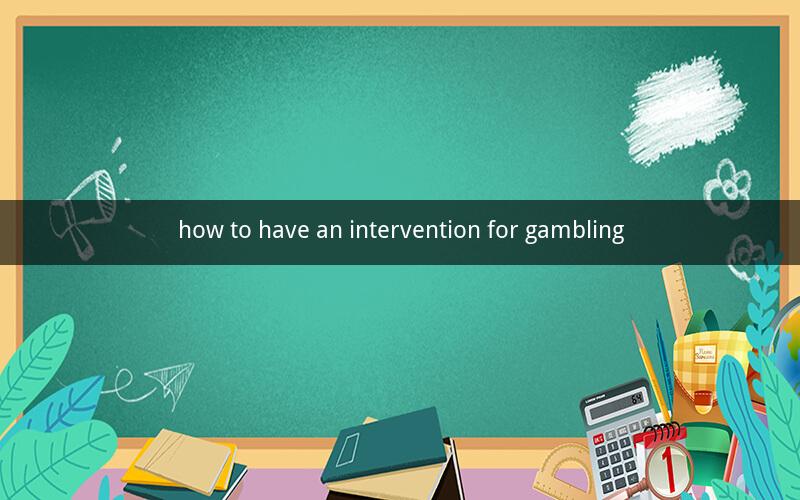
How to Have an Intervention for Gambling: A Comprehensive Guide
Table of Contents
1. Understanding the Importance of an Intervention
2. Preparing for the Intervention
3. Identifying the Right Time and Place
4. Assembling the Intervention Team
5. Crafting the Intervention Plan
6. Conducting the Intervention
7. Dealing with Resistance
8. Providing Support After the Intervention
9. Follow-Up and Continued Support
10. Resources for Further Assistance
1. Understanding the Importance of an Intervention
An intervention for gambling is a critical step in helping someone who is struggling with gambling addiction. It is a structured conversation that brings together friends, family, and professionals to confront the individual about their behavior and its consequences. Understanding the gravity of the situation and the importance of intervention is the first step in guiding the individual towards recovery.
2. Preparing for the Intervention
Before the intervention, it is essential to gather information about the individual's gambling habits, financial situation, and the impact of their addiction on their life. This preparation will help you and the intervention team to tailor the conversation to the individual's specific circumstances.
3. Identifying the Right Time and Place
Choosing the right time and place for the intervention is crucial. It should be a time when the individual is calm and not under the influence of alcohol or drugs. A private, comfortable setting where they feel safe and respected is ideal.
4. Assembling the Intervention Team
The team should include close friends, family members, and possibly a professional counselor or therapist. Each person should be chosen for their ability to offer support and express concern in a constructive manner.
5. Crafting the Intervention Plan
The intervention plan should outline the goals of the meeting, the roles of each participant, and the specific points that will be addressed. It should also include a clear plan for what happens next, such as seeking professional help or attending support groups.
6. Conducting the Intervention
The intervention should begin with an opening statement that expresses love and concern. Each participant should then take turns sharing their observations, feelings, and the impact of the individual's gambling on their lives. It is important to stay focused on the present and avoid bringing up past issues.
7. Dealing with Resistance
It is common for the individual to resist or become defensive during the intervention. The team should remain calm and non-confrontational, acknowledging the individual's feelings while emphasizing the need for change. It may be helpful to have a professional present to facilitate the conversation and manage any intense emotions.
8. Providing Support After the Intervention
After the intervention, it is crucial to provide ongoing support to the individual. This may involve accompanying them to therapy sessions, helping them to manage their finances, or simply being there to listen and offer encouragement.
9. Follow-Up and Continued Support
Regular follow-ups are essential to ensure that the individual is progressing towards recovery. This may involve family meetings, attending support groups, or working with a therapist. The goal is to help the individual maintain their sobriety and rebuild their life.
10. Resources for Further Assistance
For those who are struggling with gambling addiction, there are numerous resources available. These include:
- Gamblers Anonymous: A support group for individuals seeking to recover from a gambling addiction.
- National Council on Problem Gambling: Offers a helpline and resources for those affected by problem gambling.
- Therapists and counselors specializing in addiction: These professionals can provide personalized treatment and support.
Questions and Answers
1. What is the primary goal of an intervention for gambling?
- The primary goal is to help the individual recognize the severity of their addiction and motivate them to seek help.
2. Why is it important to prepare for the intervention?
- Preparation ensures that the conversation is focused, respectful, and effective in reaching the individual.
3. How can a professional counselor help during an intervention?
- A professional counselor can facilitate the conversation, manage intense emotions, and provide guidance on how to proceed.
4. What should be included in the intervention plan?
- The plan should outline the goals, roles of participants, specific points to be addressed, and a follow-up plan.
5. How can family and friends show support after the intervention?
- They can offer emotional support, accompany the individual to therapy, and help manage their finances if needed.
6. What resources are available for individuals struggling with gambling addiction?
- Resources include Gamblers Anonymous, the National Council on Problem Gambling, and professional therapists specializing in addiction.
7. How can an intervention help prevent a gambling relapse?
- An intervention can help by providing a strong support system and setting clear boundaries to prevent future relapse.
8. What if the individual refuses to seek help during the intervention?
- It is important to express love and concern while also setting boundaries and making it clear that support will be available if they change their mind.
9. How can friends and family help the individual rebuild their life after the intervention?
- They can help by being a constant source of support, encouraging the individual to attend support groups, and helping them find new hobbies and interests.
10. Is it possible for someone to recover from a gambling addiction?
- Yes, it is possible for individuals to recover from a gambling addiction with the right support, treatment, and dedication to change.